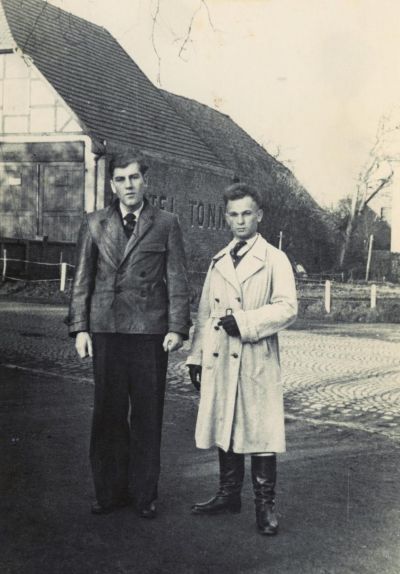The “Polish camp” in Lahde/Weser

The setting up of the Displaced Persons Assembly Centre in Lahde/Weser
The detachments of the military government were faced with the difficult task of supervising the German civil administration authorities, controlling their work and, amongst others, solving the problems of many thousands of displaced persons. To do this, Detachment 127 set up a Displaced Persons Assembly Centre (DPAC) on the northern edge of a small town called Lahde on the River Weser on 9th April 1945. This was the meeting point for thousands of freed prisoners of war, forced labourers and prisoners who had fled from the war zone in the area of Hanover. At first the existing camps in the area around Lahde were used to set up living quarters. These included the former Hannover Gestapo “work education camp”, the “Eastern workers camp” (where Russian forced labourers had been accommodated), and other barracks in the immediate neighbourhood, above all near the power station building site.
On 8th April 1945 sections of the third British infantry division were stationed along the Weser to keep order. The barracks camp quickly became overcrowded and by mid-April 1945 most parts of Lahde had been cleared to cater for the DPs. These measures were also taken in seven other places in the area. The upshot was that the local population tried to find emergency quarters in the neighbouring parishes. The newly erected DP camps in Meerbeck, Steinhude and Loccum were at first supervised by Detachment 127 in Lahde. Polish displaced persons made up the majority of the inhabitants in the Lahde DPAC. It was, and still is, known by many locals in the area as the “Polish camp”.
The UNRRA takes over responsibility for administrating the camp
After the Germans had capitulated teams from the “United Nations Relief and Rehabilitation Administration” (UNRRA) took over responsibility for administrating the DPACs. The activities of the UNRRA Teams in the PACs were supervised by the detachments.
In the following few months it became clear that UNRRA had only a limited capacity to take over all the PACs in the British occupied zone, as originally planned. For these and other reasons, a few foreign camps remained in the British occupied zone (one of these was the DPAC Lahde), under the control of special “relief” detachments from the military government.
Criminal acts in relationship to the DPACs
In 1945 and1946 there were a growing number of revenge crimes and attacks by DPs of varying nationalities against the local German inhabitants. The Weser region was also shaken by a growing quantity of murders, robberies and other brutal crimes in the first few years after the war. There is also evidence that Germans and DPs committed robberies together with Germans. The booty was often hidden in apartments belonging to German accomplices to prevent them being discovered in the DPAC. These offences reached a peak in the course of 1945 and began to decline in 1946.
Partly for foreign policy reasons, the British occupied forces took into account the fact that Polish DPs had fought alongside allied ground troops and air forces during the Second World War. After the war some of these troops remained in the service of the British forces. Freshly founded civilian units like the Civil Mixed Labour Organisation (CMLO) and the Mixed Service Organisation (MSO) were also elements in the British Army of The Rhine (BAOR). Polish displaced persons were given jobs here too.






